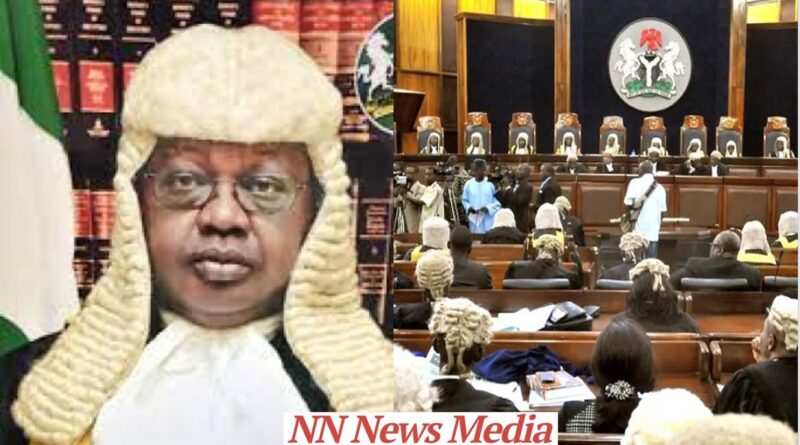Justice Dattijo cries out, says Judiciary under attack
Recently retired Supreme Court Justice, Musa Dattijo Muhammad, has issued a stark warning about the exclusion of the South East and North Central geopolitical zones from the Supreme Court, asserting that this exclusion poses a grave threat to the nation’s overall progress and development.
Justice Muhammad specifically emphasized his concern over the hearing of appeals related to the last presidential election by the Supreme Court, highlighting the fact that the exclusion of these two geopolitical zones is detrimental to the cause of justice and democracy.
The retired justice made these remarks during a valedictory court session held in his honor in Abuja on Friday. He also expressed his dismay over the depletion in the Supreme Court’s bench and joined others in advocating for urgent replacements.
Furthermore, Justice Muhammad, who was the second most senior Justice on the Supreme Court, called for a reduction in the powers of the Chief Justice of Nigeria (CJN) to prevent potential abuse of office.
In his words, “To ensure justice and transparency in presidential appeals from lower courts, the participation of all geopolitical zones is essential. It is, therefore, perilous for the democratic process and fairness for two entire regions to be excluded from decisions that affect all Nigerians. This is not in line with the intentions of our laws.”
The recent Supreme Court ruling in two separate appeals filed by Atiku Abubakar of the Peoples Democratic Party (PDP) and Peter Obi of the Labour Party (LP) upheld the election of President Bola Tinubu, who hails from the South West geopolitical zone. Atiku and Obi are from the North East and South East geopolitical zones, respectively.
Justice Muhammad also pointed out the absence of any representation from the South East in the Supreme Court following the passing of Justice Chima Centus Nweze in July 2023, and no appointment has been made to fill the void created by the death of Justice Sylvester Ngwuta of the South East region in July 2021.
Moreover, he highlighted that the North Central will also face a similar fate as the South East, as no replacement was appointed for the region two years ago after the retirements of Justice Ejembi Eko and Justice Sidi Bage.
Justice Muhammad criticized the absolute powers vested in the office of the Chief Justice of Nigeria, which, he argued, leads to potential corruption. He called for reforms to reduce the CJN’s authority over key judicial bodies, emphasizing the need for effective judicial oversight in the country.
He raised concerns about the allocation and expenditure of funds within the judiciary, as well as the disparity in salaries between justices and administrative roles within the judiciary.
In conclusion, Justice Muhammad expressed his disappointment with the present state of the judiciary, suggesting that it has strayed from its intended path and is plagued by political, self-serving, and sectional interests, leading to unpredictability in court decisions and a negative perception of the judiciary.
He urged for necessary changes to restore the integrity and independence of the judiciary.










More Stories
FG says Emefiele’s 753 seized duplexes will be sold to Nigerians
2027: ‘Energy driving Obi is organic, PDP needs him,’ says Sowunmi
UTME crisis: DSS, police arrest 20 suspects behind hacking of JAMB server